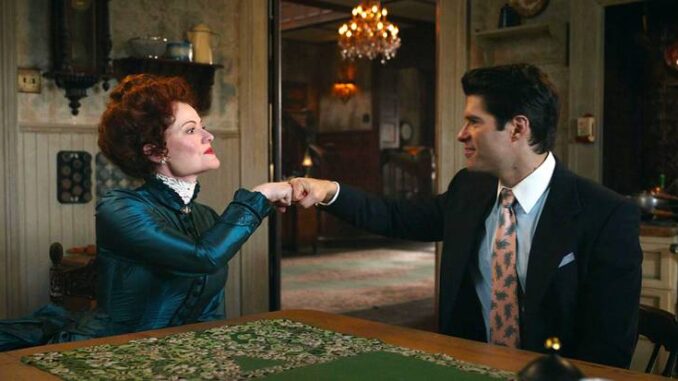
The Fabric of Connection: How Ghosts' Asher Grodman Illuminates the Hetty-Trevor Dynamic
The CBS sitcom "Ghosts" has proven to be a surprisingly insightful exploration of life, death, and the messy, beautiful in-between. While the show is grounded in humor, its strength lies in its nuanced character relationships, particularly the unexpectedly poignant connection between the prude and repressed Victorian-era Hetty, played with masterful comedic timing by Rebecca Wisocky, and the perpetually pants-less Wall Street bro, Trevor, portrayed by the equally hilarious Asher Grodman. While seemingly polar opposites, Hetty and Trevor share a unique bond that resonates far beyond their comedic bickering. Asher Grodman, in interviews and performances, has cleverly illuminated the foundation of this connection, revealing a surprising vulnerability and shared humanity beneath the superficial differences.
One key aspect of their connection, as Grodman often points out, is the underlying loneliness they both experience as ghosts. Hetty, trapped in a rigid moral framework and deeply ashamed of a past transgression, is fundamentally isolated. Her adherence to Victorian ideals, while often the source of comedic friction, is also a shield against facing her own vulnerabilities. Similarly, Trevor, though outwardly confident and surrounded by stories of his past successes, is deeply insecure about his worth. He craves connection and validation, desperately trying to recapture the glory days of his youth, often masking his inner anxieties with boisterous behavior. Grodman understands that Trevor's constant pursuit of attention and his attempts to be the "life of the party" stem from a deep-seated fear of being forgotten, a fear compounded by his spectral existence.
This shared loneliness creates a fertile ground for connection, even if it's initially expressed through antagonism. Hetty and Trevor are often each other's only constant companions. They witness each other's failures, insecurities, and fleeting moments of happiness. In a way, they become mirrors for each other, reflecting back the parts of themselves they try to suppress. Grodman’s portrayal often hints at Trevor’s underlying empathy for Hetty. While he might tease her relentless propriety, he also seems to recognize the pain and insecurity that fuels it. He understands that her rigid rules are not merely a product of her time but also a defense mechanism.
Further strengthening their bond is their shared lack of agency. Both Hetty and Trevor are confined to Woodstone Manor, unable to fully interact with the living world. This powerlessness fosters a sense of dependency on each other. They are reliant on each other for entertainment, for companionship, and sometimes even for survival in the chaotic world of the living. They navigate the challenges of their afterlife together, facing everything from unwanted houseguests to mischievous poltergeists. This shared experience, fraught with humor and hardship, forges a bond stronger than either of them might initially admit.
Perhaps the most compelling aspect of their connection is the potential for growth they offer each other. Hetty, through her interactions with Trevor, begins to question the rigid boundaries of her moral code. She slowly learns to embrace her own desires and to challenge the repressive societal norms that defined her life. Trevor, on the other hand, is confronted with the consequences of his actions and the superficiality of his past life. Through Hetty's disapproval, he is forced to confront his own flaws and to consider what truly matters beyond wealth and fleeting pleasures. Grodman expertly conveys the subtle shifts in Trevor's perspective, demonstrating how Hetty's influence, even if begrudgingly accepted, is slowly shaping him into a better version of himself.
In conclusion, the connection between Hetty and Trevor in "Ghosts" is not merely a source of comedic relief but a profound exploration of loneliness, vulnerability, and the potential for growth in the most unexpected of circumstances. Asher Grodman's understanding of Trevor's underlying insecurities and his subtle portrayal of the character's empathy for Hetty illuminates the complex and evolving dynamic between these two seemingly disparate ghosts. They are proof that even in the afterlife, connection can blossom in the most unlikely of places, forging a bond that transcends time, social class, and even the existence of pants. Their relationship offers a heartwarming reminder that even the most opposing forces can find common ground, offering each other solace, support, and a chance to finally, truly, connect.